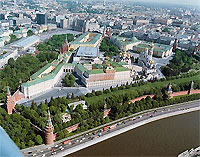Back to the Soviet era? A tougher law on registration has alarmed rights activists

(Moscow News – themoscownews.com – Anna Arutunyan – January 15, 2013)
President Vladimir Putin has introduced a bill into the State Duma calling for tougher penalties for Russians and foreigners who violate registration rules, in a bid to “civilize” internal migration.
The bill, introduced into the lower house of Parliament last Wednesday, echoed an earlier proposal by Russian lawmakers to fight the practice of registering hundreds of migrants in a single apartment.
According to 2011 statistics cited by RIA Novosti, some 300,000 people were found to be registered at 6,400 addresses.
But the new proposed amendments would affect not only migrants and foreigners, but Russian citizens who opt to rent or lease apartments.
The bill proposes increasing fines for persons who fail to register at a new place of residence to 3,000 rubles or up to 7,000 rubles in Moscow. If the violator is a legal entity, the fine could reach 800,000 rubles. Fake registration, meanwhile, could stipulate a fine of up to 500,000 rubles or up to three years in jail, according to the proposed changes cited by RIA Novosti.
Red tape headache
Currently, citizens must register with their local post office if they spend more than 90 days in a new place of residence for instance, if they move away from a home where they have been registered since birth. But while there are no available statistics, few citizens appear to take the trouble to register and the penalties for failing to register are lax, ranging from an administrative warning to a fine of 1,500 rubles (about $50).
More stringent fees and increased vigilance from local authorities could become a headache for anyone who rents an apartment, experts say.
“The documents necessary for registration remain the same a passport, an application, and a document proving that a person is residing at a given address,” Olga Romanicheva, a lawyer with the Khrenov and Partners law firm, told The Moscow News.
That document which can be a lease agreement or a statement from the landlord or the apartment’s registered resident could pose potential challenges for renters, since landlords are reluctant to provide them.
“It is common knowledge that few lease agreements are documented,” Romanicheva said.
Property owners, she added, fear that such documents not only make them liable to pay taxes on the rent, but also vulnerable before potentially corrupt local authorities.
Back to the propiska?
The proposals have raised fears that Russia could be headed back to the Soviet-era propiska system, where local authorities gave citizens written permission to reside at a particular address.
The system, introduced by the Bolsheviks in 1925, was widely criticized as a throwback to serfdom, under which peasants were tied to the land.
The propiska was outlawed in 1993, but part of the practice remained, as citizens still had to register at their place of residence. The difference was that formally, the registration process involved simply informing local authorities, not getting their permission.
Tougher penalties for failing to register could make the process more of a burden than the propiska, some rights activists say.
“It’s a return to the propiska, but it’s a lot harsher,” Svetlana Gannushkina, a member of the council of the Memorial human rights society and an expert on migrant rights, told The Moscow News. “It will essentially contradict the Constitution [which stipulates that citizens are free to move and choose their place of residence], by restricting access to available homes.”
“Even if the current registration system is purely informative, flat owners don’t want to have written [rental] agreements because they are still afraid of the government,” she said.
Going along with the president
Putin has been calling for more stringent penalties for registration violations since 2010. Earlier this year, one of his campaign promises, published in an article in Nezavisimaya Gazeta, was to regulate “internal migration,” which needed “a more civilized framework.”
His proposals have already been backed by senior lawmakers in the United Russia party.
“The migration process isn’t just about foreigners, it’s about internal mobility as well,” Alexander Khinshtein, a Duma deputy who introduced a similar bill last fall that would restrict the number of people who can be registered at a single property, told The Moscow News.
Khinshtein denied that the proposals were a return to the propiska system. “The propiska was essentially serfdom,” he said. “Today, registration is purely informative. There is nothing revolutionary in these proposals. The proposals merely increase the fines.”
Khinshtein said that the proposals aimed to make the work of officials more transparent. “We need to create conditions where [fake registration] won’t be possible,” he said.
While Khinshtein conceded that the methods proposed by President Putin differed from his own, he was supportive of the presidential bill.
“We are going to act based on the position of the president,” he said. “He determines migration policy. What is the point of objecting if he determines it?”
